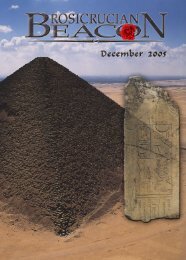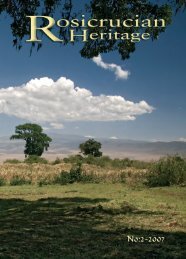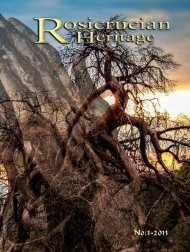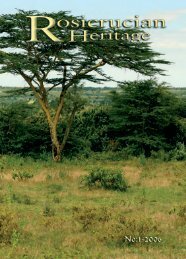with its Judeo-Christian and Greco-Roman basis increasingly rejected theold consciousness. The world becamemore and more impermeable to thedivine, archetypal and imaginalpresences. In Judaism the notion ofidolatry, which would have beenincomprehensible to the ancientEgyptians, came to dominate thereligious consciousness; while theGreeks and Romans saw the godsslowly fade away and become less and less easy tocommunicate with. 7 The new consciousness meantthat people experienced the world going through akind of solidification, so that it was no longer able totransmit the radiant energies of the divine.At the same time there emerged an increasingsense that human beings were simply terrestrialbeings and consequently, our happiness wasconceived less in cosmic terms and more in terms ofsatisfying our physical needs, desires and comforts.The material world had to be mastered to this endand this, in time, became the great project of scienceand technology, which involved an almost completeforgetfulness of our cosmic origins.It also involved a forgetfulness of that partof human existence that belongs between deathand rebirth. There was a growing identificationof the human being solely with the life that welead between birth and death. Already, boththe Greek and Judaic conceptions of life after deathexpressed the conviction that the soul survived asa pale and ghostly reflection of its former self. Asthe ghost of Achilles says in Homer’s Odyssey, “thesenseless dead [are] mere shadows of men outworn.” 8 Thisview, so very different from that of the Egyptians,culminated in the modern idea that there is simplyno existence at all after death. Modern scientificA portion of the earliest sacred literature, the Pyramid texts.Statue of Thutmose III.materialism is founded upon a totalignorance of the spirit world.At the beginning of this essay[Rosicrucian Beacon March 2008], Iproposed that ancient Egypt exposesa tension in our own culture and thatin so doing we can see its karmicrole today. The reason why it may behelpful to see Egypt in these termsis because we are now coming tothe end of the Greco-Roman/Judeo-Christian era. It has achieved its purpose, whichwas to make us more individuated, more self(rather than god) centred in our soul-life, and thusmore free.Becoming Aware again ofInner Spiritual RealitiesNow there is a need to become aware again of inner,spiritual realities but to become aware of themgrounded in our own sense of self, and with a clearand discriminating intelligence with which we canonce more turn toward them. So I would suggestthat it is here that the profound karmic relationshipis working between ancient Egypt and the new erathat is beginning to unfold before us.We are driven to find our own newrelationship to the spiritual dimension.While our relationship to ancient Egyptis certainly based upon our acquiring a deeperand more accurate knowledge of its culture andreligion, the relationship is by no means simply inthe direction of the present to the past. It is also abouthow the past can support us in forging our ownfuture by helping us to re-engage with the spiritualdimensions which were so intrinsic to people’sexperience in times of old. 9What ancient Egypt can do today is to provideboth the impetus and the anchorage for a modernesotericism. By esotericism I mean knowledge ofinner realities. There is no question of “going back”to ancient Egypt. It is rather the case that by wrestlingwith ancient Egyptian sacred texts, we are drawndown to a deeper level of awareness that we needto make more conscious. And feeling this need, weare driven to find our own new relationship to thespiritual dimension.As I see it, there are three tasks ahead forcontemporary esotericism. The first is to grow intoa fully felt and participative relationship with theThe Rosicrucian Beacon -- June 2008
imaginal worlds that stand behind the physical. Weneed constantly to work at dissolving the densityof the physical and literal world. We need to loosenits solidity in order to see through to the luminousworld of spirits, gods and archetypes that are itsinvisible matrix. They are, in a sense, the “dream”of the world that our modern, all too wide-awakeconsciousness, has destroyed. There is a need todayto return our waking consciousness to this dream, bybringing it once more into a living relationship withthe imaginal dimensions of the world.Along with this comes the second task, whichis to expand our conception of ourselves beyond theconfines of the earth by developing a sense that thecosmos that surrounds us is not just dead matter,but full of soul. To do this we need not so much towork against as to work through the materialisticconceptions that permeate modern cosmologicalthinking. We can develop once again a feeling forthe soul-qualities of the planets and constellations,for the whole world of the stars. And the more weare able to do this, the more we are able to connectwith the “world soul” or anima mundi as it used tobe called, the more will we be able to reconnect againwith our own cosmic nature.I see the third task as being once more tobecome aware of the realm of death as the other halfof life, as much a part of our existence as sleep is apart of our life between birth and death. It requiresthat we see this realm of death not so much as a placethat we go to after we die, as a realm that we inhabit,or one might say inhabits us, alongside the worldof the living. The world of death can be understoodas a completely interior world, and yet despite thefact that it has no dimensions, it is not necessarilyinaccessible to consciousness. For its interiorityultimately coincides with our own. The more webecome aware of the source of what arises in ourown consciousness, the more do we extend ourconsciousness towards this deeply interior realm ofdeath. And in extending our consciousness towardsit, we extend our consciousness towards that otherhalf of existence without which we cannot fullyparticipate in life. 103. The “Annals” at Karnak, recording Thutmose Ill’s campaigns,are couched in mythical and theistic language. The king isdescribed as acting in consort with Amun-Ra against the“wretched enemy”—implicitly identified with the forcesof cosmic chaos. The mystical fusion of king and sun godis even more explicit in the so-called “poetical stela” ofThutmose III found at Karnak. Both texts are translatedin Miriam Lichtheim, Ancient Egyptian Literature: A Book ofReadings, (Berkeley: University of California Press, 1976),2:30-39.4. The Ancient Egyptian Book of the Dead, trans. R, O. Faulkner(London: British Museum Publications, 1972), ch.130.5. Alison Roberts, My Heart, My Mother (Roaingdean:Northgate, 2000), 174-178. It is explicitly stated in TheBook of What is in the Underworld (Amdwat), div.l, that thetext is “useful for those who are on earth” and similarindications can be found in The Book of the Dead, which hasbeen compared by Terence DuQuesne, A Coptic InitiatoryInvocation (Thame: Darengo, 1991), 52nll2, with the TibetanBardo Thodol, a text clearly intended for spiritual practice.6. Garth Fowden, The Egyptian Hermes (Princeton: PrincetonUniversity Press, 1986), ch.7; and David Frankfurter, Religionin Roman Egypt (Princeton: Princeton University Press, 1998),chaps. 5 and 6.7. See, for example, Plutarch’s essay, “The Decline of theOracles,” in Plutarch, Moral Essays, trans. Rex Warner(Harmondsworth: Penguin Books, 1971), 31-96.8. Homer, The Odyssey, trans. Ennis Rees (Indianapolis: Bobbs-Merrill, 1977), 188.9. In a series of lectures on the relationship of Egyptianmythology to modern civilisation, Rudolf Steiner, Universe,Earth and Man, trans. Harry Collison (London: RudolfSteiner Publishing Co., 1941), 250ff., makes the followingstatement: “What we call ‘future’ must always be rooted inthe past; knowledge has no value if not changed into motivepower for the future. The purpose for the future must bein accordance with the knowledge of the past, but thisknowledge is of little value unless changed into propellingforce for the future.”10. This text, “Ancient Egypt and Modern Esotericism” ©Jeremy Naydler, 2006 is reprinted with permission of theauthor. All Rights Reserved.Illustration Sources• Figure 6 The sky-goddess Nut conceals within her body themysterious inner region. From the abbreviated version of theBook of Night on the ceiling of the sarcophagus chamber ofthe tomb of Harnesses IX, Valley of the Kings, from ErikHornung, The Valley of the Kings, trans. David Warburton(New York: Timken, 1990), 79. Every effort has been made tofind the copyright owner.Endnotes1. Naydler, Temple of the Cosmos, 26 and 215-217.2. W. Brede Kristensen, Life Out of Death: Studies in the Religionsof Egypt and of Ancient Greece, trans. H. J. Franken and G.R. H. Wright (Louvain: Peeters Press, 1992), 28, comments:“The world of death secreted greater powers and containedricher possibilities than the world of finite experience. It wasthe basis for the whole existence which we are apt to callworldly life.”The Rosicrucian Beacon -- June 2008











